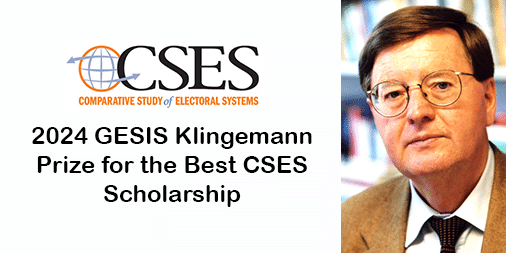Note: The following announcement was sent to the CSES email list. To receive notices like this one by email, please join our mailing list.
March 25, 2024
The Comparative Study of Electoral Systems (CSES) and the GESIS – Leibniz Institute for the Social Sciences are pleased to announce a competition for the 2024 GESIS Klingemann Prize for the Best CSES Scholarship for the best CSES scholarship (paper, book, dissertation, or other scholarly work, broadly defined) published in the calendar year prior to the award.
The prize is named in honor of Professor Doctor Hans-Dieter Klingemann, an internationally renowned political scientist, a major contributor to comparative research, and co-founder of the CSES project.
Nominations are now being accepted for the current year’s award. Nominated works must make extensive use of CSES and have a publication date in the calendar year 2023, either in print or online. Anyone is allowed to nominate or self-nominate a scholarly work for consideration by sending an email to the CSES project ([email protected]) naming the scholarly work and providing a justification for its consideration.
All persons are eligible to receive the award, except for the three persons that serve on the Selection Committee for the year. The current year’s Selection Committee is comprised of: Noam Gidron of the Hebrew University of Jerusalem in Israel, Rosario Queirolo of the Universidad Católica del Uruguay (Chair), and Jan-Lucas Schanze of the GESIS – Leibniz Institute for the Social Sciences in Germany.
Nominations will be accepted until Friday, April 26, 2024.
The award winner will receive a 1,000 Euros prize, and up to an additional 1,000 Euros toward travel, accommodation, and conference registration expenses to attend the award ceremony. This year’s award ceremony is to be held at the annual meeting of the American Political Science Association (APSA) in Philadelphia, United States during September 5-8, 2024. The winner of the prize will be asked to make a presentation of their work at the award ceremony.
You may also be interested to read about the past year’s winning work, “Can’t We All Just Get Along? How Women MPs Can Ameliorate Affective Polarization in Western Publics” or to learn more about other past prize winners.
We look forward to your nominations!

